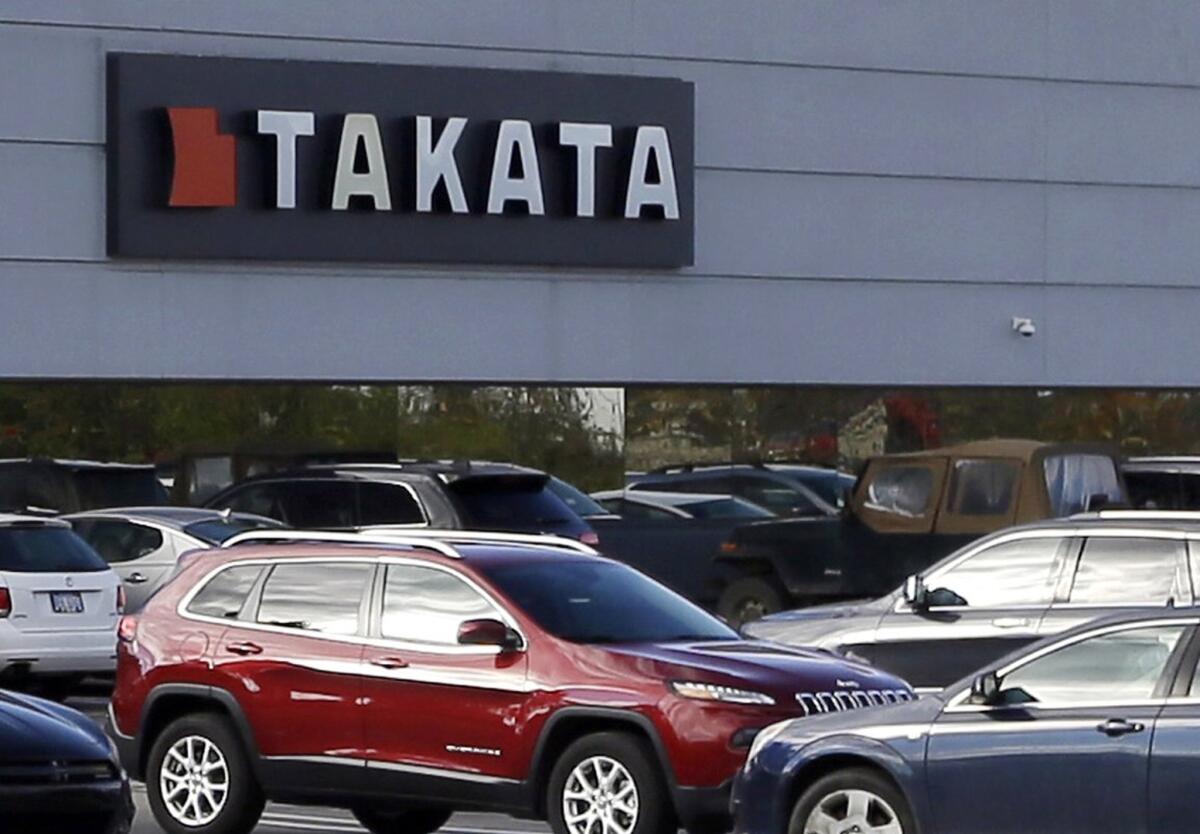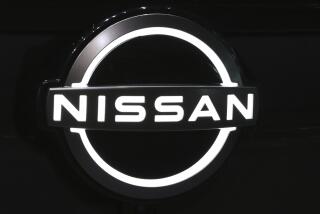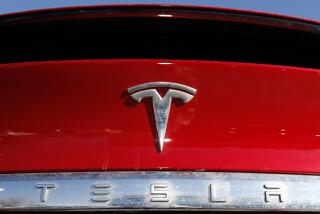Takata fined $70 million for faulty airbags in at least 19 million U.S. vehicles

This Oct. 22, 2014, photo shows the North American headquarters of automotive parts supplier Takata in Auburn Hills, Mich.
- Share via
Reporting from Washington — Takata Corp. was dealt a double blow on Tuesday as it was fined $70 million by U.S. regulators and Honda Motor Co. said it would not equip new vehicles under development with the supplier’s front driver or passenger air bag inflators.
The Japanese auto supplier was penalized for failing to notify authorities of faulty air bags in at least 19 million U.S. vehicles, resulting in recalls that could last four years.
------------
FOR THE RECORD
Nov. 3, 1:35 p.m.: An earlier version of this article said regulators doubled the number of recalls to about 34 million. There are about 19 million recalls.
------------
The fine could hit a record $200 million if Takata fails to meet the commitments made in two formal consent orders, or if additional violations are discovered.
The Japanese auto supplier also agreed to phase out the propellant that caused some airbags to explode and to submit to five years of oversight by an independent monitor.
“For years, Takata has built and sold defective products, refused to acknowledge the defect and failed to provide full information to [the National Highway Traffic Safety Administration], its customers or the public,” said Transportation Secretary Anthony Foxx. “The result of that delay and denial has harmed scores of consumers and caused the largest, most complex safety recall in history.”
In some cases, vehicle owners might need to have their airbags replaced a second time because a temporary fix might be needed due to parts shortages, according to the NHTSA.
So far, exploding airbags are believed to have caused at least seven deaths and nearly 100 injuries in the United States.
In a settlement with federal officials, Takata agreed to declare that inflators in the airbags are defective. The inflators use a propellant made from ammonium nitrate that can burn too hot and cause the bags to explode.
The NHTSA has given manufacturers until the end of 2019 to make the repairs but said that was an accelerated timetable that will give priority to vehicles at greater risk.
Mark Rosekind, administrator of the NHTSA, urged drivers to check their vehicle identification numbers on safercar.gov/recallspotlight to determine whether the airbag needs to be replaced.
The number of affected vehicles could continue to grow as more automakers discover problems. So far, models from 12 brands have been identified.
The massive recall presents challenges, said Clarence Ditlow, executive director of the Center for Auto Safety. Owners might have to wait for replacement parts to become available, and vehicles could change hands before the repairs are made, he said.
“What if you go there, and you’re on the list, but there’s no inflator available? Are you going to remember it four years from now when the inflator finally becomes available?” he said.
Recalls of older vehicles typically have about a 60% completion rate, raising the prospect that millions of cars with the faulty airbags could remain on the road, Ditlow said.
The company issued a written statement apologizing for endangered the driving public.
“This settlement is an important step forward for Takata that will enable us to focus on rebuilding the trust of automakers, regulators and the driving public,” Shigehisa Takada, chairman and CEO of Takata, said in the statement. “We will comply with all aspects of the settlement and are committed to being part of the solution.”
Honda, Takata’s biggest customer, said it decided to no longer use the air bag inflators after reviewing Takata internal documents that suggested the supplier “misrepresented and manipulated test data for certain air bags.”
The automaker said it is working with other suppliers to replace Takata inflators in its cars already on the road.
Takata earlier resisted a widespread recall, and in February, the NHTSA hit the company with fines of $14,000 a day for not cooperating with a federal safety investigation. Those fines totaled more than $1 million, but were suspended after Takata admitted the defect and agreed to work with regulators, the NHTSA said.
The largest fine previously levied by the NHTSA was $105 million. Fiat Chrysler Automobiles was ordered to pay that penalty this summer for not moving fast enough in 23 different recalls for a variety of problems covering more than 11 million defective vehicles.
In addition, the agency required Fiat Chrysler to buy back as many as 193,000 flawed vehicles -- mostly 2008-12 Ram trucks -- at a cost of about $900 million.
The NHTSA is limited to fines of $35 million for recall violations and cannot assess penalties per vehicle. Obama administration officials have pushed to raise the cap to $300 million, and some lawmakers want to remove the limit.
Automakers can face much stiffer penalties from criminal investigations.
Last year, Toyota Corp. agreed to pay $1.2 billion -- a record penalty for an automaker -- to settle a Justice Department probe into whether the firm properly reported safety complaints about sudden vehicle acceleration to regulators.
In September, General Motors Co. agreed to pay $900 million to settle a Justice Department investigation into recall delays for vehicles with faulty ignition switches.
Follow @JimPuzzanghera on Twitter.
More to Read
Inside the business of entertainment
The Wide Shot brings you news, analysis and insights on everything from streaming wars to production — and what it all means for the future.
You may occasionally receive promotional content from the Los Angeles Times.











